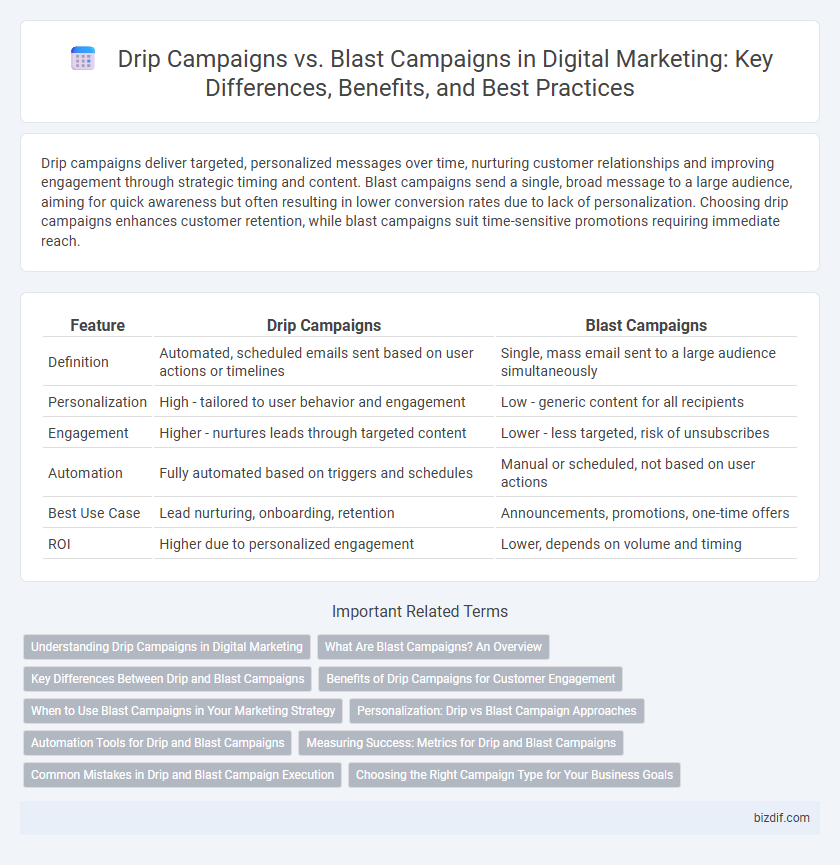Drip campaigns deliver targeted, personalized messages over time, nurturing customer relationships and improving engagement through strategic timing and content. Blast campaigns send a single, broad message to a large audience, aiming for quick awareness but often resulting in lower conversion rates due to lack of personalization. Choosing drip campaigns enhances customer retention, while blast campaigns suit time-sensitive promotions requiring immediate reach.
Table of Comparison
| Feature | Drip Campaigns | Blast Campaigns |
|---|---|---|
| Definition | Automated, scheduled emails sent based on user actions or timelines | Single, mass email sent to a large audience simultaneously |
| Personalization | High - tailored to user behavior and engagement | Low - generic content for all recipients |
| Engagement | Higher - nurtures leads through targeted content | Lower - less targeted, risk of unsubscribes |
| Automation | Fully automated based on triggers and schedules | Manual or scheduled, not based on user actions |
| Best Use Case | Lead nurturing, onboarding, retention | Announcements, promotions, one-time offers |
| ROI | Higher due to personalized engagement | Lower, depends on volume and timing |
Understanding Drip Campaigns in Digital Marketing
Drip campaigns in digital marketing deliver targeted, automated messages to prospects and customers over time, nurturing leads with personalized content based on user behavior and engagement patterns. These campaigns improve conversion rates by maintaining consistent communication and guiding users through the sales funnel with timely, relevant touchpoints. Unlike blast campaigns, which send a single message to a broad audience, drip campaigns optimize customer journeys by leveraging segmentation and automation tools for ongoing relationship building.
What Are Blast Campaigns? An Overview
Blast campaigns in digital marketing involve sending a single, generic message to a large audience simultaneously, aiming to maximize immediate reach and brand awareness. These campaigns typically lack personalization, targeting broad segments rather than individual preferences, which can lead to lower engagement rates compared to more tailored approaches. Marketers use blast campaigns for product launches, announcements, or promotions where speed and volume outweigh customization, making them a common strategy for quick, wide-scale communication.
Key Differences Between Drip and Blast Campaigns
Drip campaigns deliver automated, personalized messages to targeted segments over a set period, fostering engagement and nurturing leads through tailored content. Blast campaigns send a single, non-personalized message to a broad audience, aiming for immediate impact and quick reach. Key differences include timing, personalization, and engagement strategies: drip campaigns emphasize gradual relationship-building, while blast campaigns prioritize mass exposure and rapid results.
Benefits of Drip Campaigns for Customer Engagement
Drip campaigns deliver targeted, personalized content over time, fostering stronger customer relationships and higher engagement rates compared to one-time blast campaigns. Automated sequences in drip marketing nurture leads by providing relevant information at critical points in the buyer journey, increasing conversion potential. This sustained interaction reduces unsubscribe rates and enhances brand recall, driving long-term customer loyalty.
When to Use Blast Campaigns in Your Marketing Strategy
Blast campaigns are effective for time-sensitive promotions or announcements requiring immediate audience attention, such as flash sales or product launches. They deliver a single, broad message to a large audience, maximizing reach and urgency. Use blast campaigns when rapid exposure is critical to drive short-term engagement or conversions.
Personalization: Drip vs Blast Campaign Approaches
Drip campaigns leverage advanced segmentation and behavioral data to deliver personalized content tailored to individual customer journeys, enhancing engagement and conversion rates. In contrast, blast campaigns rely on a one-size-fits-all approach, sending the same message to a broad audience with minimal customization, often resulting in lower relevance and higher unsubscribe rates. Marketing automation tools enable the precise scheduling and targeting of drip campaigns, maximizing personalization and long-term customer value.
Automation Tools for Drip and Blast Campaigns
Automation tools for drip campaigns, such as HubSpot, Mailchimp, and ActiveCampaign, enable marketers to deliver personalized, sequential messages based on user behavior and engagement triggers. Blast campaign automation platforms like Constant Contact and Sendinblue facilitate one-time, mass email sends to large audiences for promotions or announcements without sequencing. Utilizing these tools enhances targeting precision, maximizes open rates, and streamlines campaign management in digital marketing strategies.
Measuring Success: Metrics for Drip and Blast Campaigns
Measuring success in drip campaigns focuses on engagement metrics such as open rates, click-through rates, and conversion rates that indicate personalized communication effectiveness over time. Blast campaigns prioritize immediate metrics including delivery rates, open rates, and overall reach to assess the impact of wide audience targeting. Analyzing customer retention and lead nurturing performance differentiates the sustained value of drip campaigns from the rapid exposure gained by blast campaigns.
Common Mistakes in Drip and Blast Campaign Execution
Common mistakes in drip campaign execution include sending overly generic messages that fail to engage segmented audiences, and neglecting to monitor user interaction data for timely follow-ups. Blast campaigns often suffer from poor list targeting and excessive frequency, leading to high unsubscribe rates and reduced email deliverability. Both approaches require continuous optimization based on open rates, click-through rates, and conversion metrics to maximize ROI in digital marketing strategies.
Choosing the Right Campaign Type for Your Business Goals
Drip campaigns deliver personalized, timed content to nurture leads and build long-term customer relationships, making them ideal for businesses focused on engagement and conversion over time. Blast campaigns send a single, mass message to a broad audience, best suited for immediate promotions or announcements requiring quick attention and response. Selecting the right campaign type depends on your business goals, such as prioritizing sustained engagement with drip campaigns or maximizing immediate reach through blast campaigns.
Drip campaigns vs Blast campaigns Infographic

 bizdif.com
bizdif.com